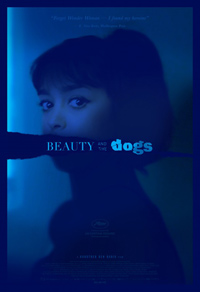Body Talk: Ben Hania’s Troubled and Troubling Portrait of Sexual Assaul
 Perfectly encapsulating, perhaps to the heights of exaggeration and exploitation, why victims of sexual assault often avoid reporting their trauma, Tunisia’s Kaouther Ben Hania manages to push buttons with her enraging third film Beauty and the Dogs. Premiering out of the Un Certain Regard sidebar of the 2017 Cannes Film Festival, the title makes its limited US theatrical release in the aftershocks of the Me Too movement originating from the downfall of lascivious Hollywood titan Harvey Weinstein.
Perfectly encapsulating, perhaps to the heights of exaggeration and exploitation, why victims of sexual assault often avoid reporting their trauma, Tunisia’s Kaouther Ben Hania manages to push buttons with her enraging third film Beauty and the Dogs. Premiering out of the Un Certain Regard sidebar of the 2017 Cannes Film Festival, the title makes its limited US theatrical release in the aftershocks of the Me Too movement originating from the downfall of lascivious Hollywood titan Harvey Weinstein.
Conversations regarding Ben Hania’s film will perhaps be usurped or framed within this context even as it remarks specifically upon the Tunisian judicial system (which perhaps makes it a more interesting counterpoint to the amorous escapades of Kechiche’s roundly dismissed Mektoub, My Love: Canto Uno, 2017). While its production value and design go a long way in asserting its technical highpoints, Ben Hania’s increasingly labored narrative somehow loses sight of its trampled heroine between its hopelessly corrupt law officials and hyper cynical tone. As an exercise in tainted bureaucracies, specifically those designed to keep the disenfranchised out of power and without a voice, Ben Hania’s film works best but otherwise loses its abilities to humanize any of its characters beyond their harrowing trauma or overbearing villainy.
We predict Mariam’s (Mariam Al Ferjani) doom long before her out-of-frame assault. In the bathroom of a pulsating college co-ed party, she takes reprieve with two friends, snapping a selfie and ignoring a phone call from her father, who we assume wouldn’t be too thrilled to see his daughter employing such agency over the display of her body (a similar use of the cell phone as patriarchal tracking device is used for a sequence in Mani Haghighi’s recent Pig). A brief flirtation with the handsome Youssef (Ghanem Zrelli) leads us into sudden distress as we learn they were apprehended by some errant law enforcement officials, who forced Mariam into their car and raped her. When she at last escapes, her purse, containing her identification, is left behind. Accompanying her to a private clinic, Youssef attempts to assist Mariam, only to run into their first of many perceived roadblocks within a system designed to assist perpetrators instead of victims. Without any identification, Mariam is turned away from seeing a doctor (“What if she tries to accuse someone of rape?” inquires an incredulous female admitting nurse). Arriving in the chaos of an emergency room at a public hospital, Mariam and Youssef are handled just as dismissively—there isn’t a protocol for incoming rape victims. Instead, she’s shuttled off to the entity she dreads most, the police station. While meager hope arrives thanks to the presence of a pregnant police officer, this security is short lived. Mariam is not in a place where women are inclined to support one another. Meanwhile, the threat of her father’s shame, among several other clichéd patriarchal tactics, are used by fellow police officers trying their best to threaten and dissuade Mariam from pressing charges. And then she finds the vehicle with her purse…
Beauty and the Dogs works best in its opening sequences, where the dread is sometimes palpable, thanks to its electric neon dance hall sequences and several studied long takes from debuting cinematographer Johan Holmquist. Actress Mariam Al Ferjani makes her debut with a complex and often thankless characterization of a woman whose victimization is constantly compounded. At several points, she agrees to end her quest for justice even before it begins (“God will punish them,” she shouts at one point to Youssef), and yet maintains composure despite her excoriating predicament.
The wide array of villainous supporting characters, however, takes the callousness of Beauty and the Dogs to almost cartoonish level. Ben Hania is hardly alone with such overbearing depictions of brutality—many European genre-tinged procedurals dealing with defenseless populations fall into the nadir of exploitation, such as Michel Hazanavicius’ The Search (2014) or the brutality waged against lesbians in Croatia’s first LGBT themed drama Fine Dead Girls (2002). While Beauty and the Dogs reflects a continually troubling global issue concerning conditioned cultural misogyny, it adds little to the conversation beyond extending a sort of perilous, desensitizing footnote to a pernicious reality.
★★½/☆☆☆☆☆


